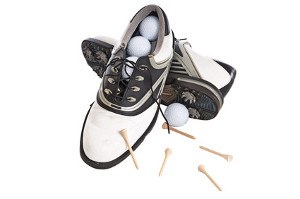
Some folks insist that golfers aren’t real athletes. Apparently, nobody told golf shoe manufacturers.
Golf shoes have come light years since the no-so-distant days of thick, heavy soles and cumbersome tassels. In fact, some golf shoes could pass for everyday sneakers in both style and features.
Nowhere is comfort more important than on your feet, especially if you often walk when playing. Of course, traction and stability are crucial, too; fortunately, any golf shoe from a major brand should provide the grip you need.
Put the following features and benefits on your checklist when shopping for golf shoes:
- Lightweight, flexible construction: Synthetic or fabric-based shoes are often very light, but there are featherweight leather models, too. It’s wise to try on shoes before buying to test flexibility and support.
- Waterproof materials: It’s easy to get your feet wet on the golf course, so make sure your shoes come with at least a one-year waterproof warranty. Note: Don’t confuse water-resistant with waterproof. Waterproof shoes are impermeable regardless of how much moisture they take on; water-resistant surfaces eventually give way if they get wet enough.
Moisture wicking: Everyone’s feet sweat, so find a pair with interior lining that pulls moisture off the feet. Best are shoes with built-in sockliners.
Choosing the right golf shoes is crucial for comfort, stability, and performance on the golf course. Here are some tips to help you choose the perfect pair of golf shoes:
- Comfort: Comfort is paramount when selecting golf shoes. Look for shoes with cushioned insoles, adequate arch support, and a comfortable fit that allows your feet to move naturally during the swing.
- Waterproofing: Choose golf shoes with waterproof or water-resistant features to keep your feet dry during wet and rainy rounds.
- Breathability: Look for shoes with breathable materials that allow air circulation to prevent your feet from getting sweaty and uncomfortable.
- Spikes vs. Spikeless: Decide between spiked and spikeless golf shoes based on your preference and the course conditions. Spiked shoes offer better traction, especially on hilly and wet terrain, while spikeless shoes are versatile and can be worn on and off the course.
- Fit: Ensure that the golf shoes fit snugly but not too tight. A proper fit prevents blisters and enhances stability during your swing.
- Style: Choose a style that complements your overall golf attire and personal taste. Classic and athletic designs are popular choices.
- Support: Look for golf shoes with good lateral support to help maintain stability during the golf swing.
- Quality and Durability: Invest in high-quality golf shoes that will withstand frequent use and last for several seasons.
- Arch Type: Consider your arch type (high, medium, or low) when choosing golf shoes. Some brands offer models specifically designed for different arch types.
- Brand Reputation: Research golf shoe brands known for their performance and comfort. Reputable brands often prioritize golfer's needs when designing their shoes.
- Spikes Replacement: If you opt for spiked golf shoes, check if the spikes are replaceable. This ensures you can keep using the shoes even after the spikes wear out.
- Traction: Pay attention to the traction pattern on the outsole of the shoes. A good traction pattern provides stability and prevents slipping during the swing.
Q&A on Golf Shoes:
- Can I wear running or athletic shoes for golf? While athletic shoes might be comfortable, they lack the necessary traction and support for golf. It's best to invest in golf-specific shoes.
- Can I wear spikeless shoes on any golf course? Spikeless shoes are generally acceptable on most golf courses, but it's essential to check the course's specific dress code.
- How often should I replace my golf shoes? The lifespan of golf shoes depends on frequency of use and care. As a general rule, consider replacing them every 1-2 years or when you notice signs of wear and tear.
- Are waterproof golf shoes necessary? Waterproof golf shoes are beneficial, especially if you play in wet or rainy conditions. They keep your feet dry and comfortable throughout the round.
- Can I wear golf shoes with metal spikes? Most golf courses no longer permit metal spikes due to potential damage to the greens. Soft spikes or spikeless shoes are more widely accepted.
Remember to prioritize comfort and performance when choosing golf shoes. Finding the right pair will ensure you can walk the course comfortably and confidently focus on your game.





